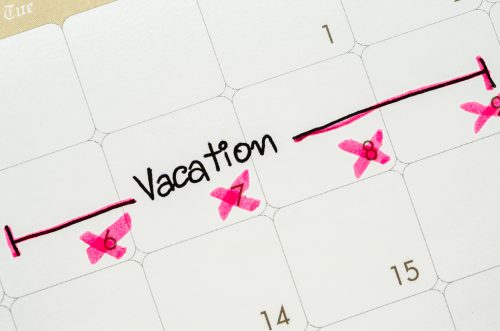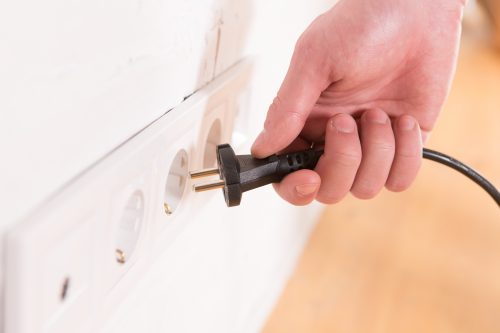Whether you love to leave on a whim, with only your passport, backpack and a sense of adventure, or you need to plan every detail of your upcoming vacation, there’s one big thing you don’t want to forget about: preparing your home for your trip.
The primary reason to get your house in proper shape before you leave on vacation is safety. An empty home is an easy target for burglars, and you don’t want your home to appear unoccupied. But in addition to safety, properly preparing your home before you go on a two-day or two-week vacation can save you money and help ensure that you won’t come home to any surprises. Just because your house is empty of people doesn't mean that the appliances and lights have stopped sucking electricity from the grid.
Follow these tips to mitigate safety risks and improve energy saving in your home while on vacation so you can put that extra money toward your trip instead.
Prepare the Outside of Your Home
- Install a motion-activated sensor to your outdoor light.
- Get rid of that spare house key you have hidden behind the rock in your garden. While you’re gone, this can only lead to trouble.
- Park your car in the garage, because there’s no telling what the birds will be up to when you’re away.
- Depending on how long you’ll be gone, ask a neighbor or friend to come by and mow the lawn.
- Keep your plants fed! If you don’t have someone who can come over to water them, purchase some self-watering plant stakes.
Prepare the Inside of Your Home
- Keep some lights on or put a timer on a couple of lamps. It gives the illusion of being home and prevents wasted energy by keeping lights off during the day.
- Clean. The worst way to end a great vacation is to come home to a pile of laundry and a dirty house. Make the transition easier by leaving a clean home behind! Do the laundry, pick up, scrub and sweep.
- Take out the trash. You don’t want your garbage to fester and smell up the house while you’re away.
- Turn off the water valves to the dishwasher, shower, sink and washing machine. In the event of a plumbing problem this could prevent a damaging and costly flood.
How to Save Energy While You’re Away and Keep Energy Costs at a Minimum
- Walk around your home and unplug unnecessary appliances and electronics. This doesn't just include the television, lamps and entertainment center. Small electronics like electric razors, coffee pots, digital clocks and cell phone chargers all drain energy when plugged in. This not only saves energy, but also eliminates a possible fire hazard if there is a power surge while no one is home.
- Shut off the circuit breaker to the water heater. If you have a gas heater, turn the gas valve off to be safe. Upon returning home, the hot water tap should be allowed to run before the power and gas are turned on to make sure the water tank isn't empty. It can damage the unit if the tank is heated without any water in it. If you go on a winter vacation, you should leave the water heater on at the lowest possible (or "vacation" setting) to keep the water from freezing in the lines and tank.
- With everyone out of the home for a few days, there is no reason to keep the heater or central air running, unless pets will be left at the house. Instead, during the hot summer months, the thermostat can either be set for 85 or turned off completely. The winter is a little more tricky. The winter thermostat setting when away should be around 50 degrees to keep appliances and pipes from freezing. The worst way to end a vacation is to come home to a flooded basement or frozen dishwasher.
- If your home has a programmable thermostat that can be adjusted by date, it can be keyed to an appropriate thermostat setting while on vacation, then changed to a more comfortable temperature to greet the family the day of arrival.
- Lower the blinds and close the curtains when leaving for vacation. This simple act will keep heat from coming in during the summer and escaping in winter. If the furnace is on and set to a lower temperature, lowering the shades and closing the curtains helps to slow the rising or lowering of the temperature in the home.
- Before leaving on an extended vacation, you should unload the food and clean out the refrigerator thoroughly, leaving the doors open to air out. Also, place a box of baking soda in the freezer and refrigerator to draw in the moisture and help prevent mold growth. Taking the refrigerator offline will save a significant amount of energy while nobody is home.
- As an alternative to turning off the refrigerator, set the temperature to 42 degrees and the freezer to 5 degrees. This increase is enough to keep everything cold and frozen, but still save energy over the vacation period.
Additional Safety Preparations
- Tell a neighbor or friend who lives nearby that you’ll be leaving for a little while. Ask them to come by the house a few times to make sure everything is in order.
- Either stop your mail and newspaper delivery service or have a reliable neighbor pick them up each day while you’re gone. A full mailbox or driveway full of papers is a sure sign to thieves that the house is unoccupied.
- Make sure you leave an itinerary and emergency phone numbers with several people before you leave.
- Pack a first aid kit that includes a supply of prescription medications, plus basic necessities like bandages, antibiotic ointment and common over-the-counter medications. If you'll be soaking up the sun, throw in some sunscreen and aloe vera gel.
- Pack your cash and credit cards in different locations. If you spread these sources of payment across multiple bags, purses and wallets, you'll maximize your odds of having access to funds in the event of loss, theft or missing luggage.
- Make a plan to stay together. If your group of family or friends will be splitting into smaller groups, set a time and place to meet up again.
- Stay hydrated. Traveling and exploring can be hard work, so pack a reusable water bottle for everyone in your traveling party. Top them off whenever you stop somewhere with access to fresh drinking water.
- Finally, be very careful about what you share on social media. Remember, thieves are looking for unoccupied homes, so be prudent about sharing those shots of you and your family having the time of your lives!

